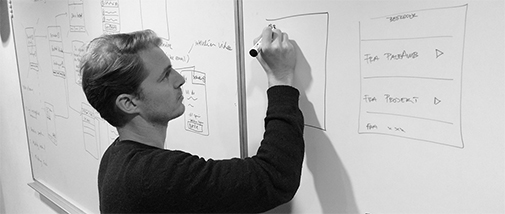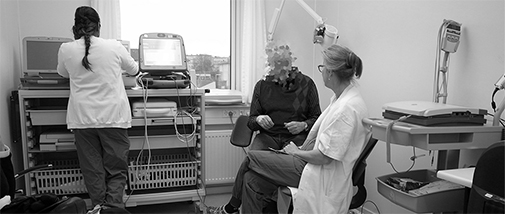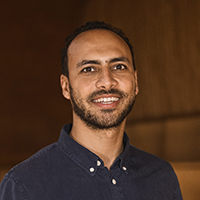- Department of Computer Science DIKU
- Research
- Research Groups
- Health Informatics
Health Informatics
Our overall aim in health informatics is to research, design and prototype information systems that improve the quality and efficiency in healthcare.
This includes a variety of clinical information systems that support communication and collaboration and target broader or more particular settings, such as electronic health records, decision-support applications, and patient management systems. Over the last decade, patients have come to play an important role in their own treatment and care, leading to increased interest in patient-centered e-health services such as telehomecare platforms, personal health records, and consumer-oriented mobile apps. The purpose of these services is to enable patients to engage in self-management and exchange experiences and advices to better cope with day-to-day personal health issues.
We focus on:
- Exploring the potentials and preconditions for adequate e-health services meant for specific settings
- Designing e-health services that assist aligning the concerns of patients and clinicians
- Designing IT-support for medical reasoning
SCAUT Project
Scaut is a research and development project that aims to make it very easy for patients with an advanced pacemaker to collaborate with clinicians around early detection of signs and symptoms. We will develop an app that lets patients take action on their disease from home and a clinical platform that uses advanced analytics to predict deterioration.
SCAUT is short for Self-, Collaborative- and AUTo-detection and runs from 2014-2018. The project is a collaboration between the Department of Computer Science at the University of Copenhagen, The Heart Centre at the University Hospital of Copenhagen (Rigshospitalet), Rehfeld and Medtronic and is partly funded by the Danish Innovation Foundation.
See more here.
 |
 |
Co-Constructing IT and Healthcare (CITH)
The CITH project (2008-2013) focused on the treatment and telemonitoring of chronic heart failure patients with an advanced pacemaker (ICD) at the Heart Centre at Rigshospitalet and Bispebjerg Hospital. The project developed and tested web-based prototypes of patient-centered e-health applications and inter-institutional communication for clinicians.
Net4Care
The Net4Care project designed and created prototypes of an ecosystem for telemedicine applications in order to accelerate the development of and create a new market for healthcare services.
Connect2Care
The Connect2Care project identified and developed open technical standards, with a special focus on ICT-based solutions in and around the home.
Completed PhD Thesis Projects
Nielsen, K.D. 2015. Invited to Participate? An Ethnography of Patient-Involving E-health in Heart Care. PhD Thesis. Faculty of Medical Sciences, University of Copenhagen. 257 pp.
Manikas, K. 2015. Analyzing, Modelling, and Designing Software Ecosystems: Towards the Danish Telemedicine Software Ecosystem. Ph.D. thesis, Department of Computer Science, Faculty of Science, University of Copenhagen.
Kierkegaard, P. 2014. The coordination of care across borders: Exchanging patient information across international, national and institutional boundaries. PhD. thesis, Faculty of Science, University of Copenhagen.
Mønsted, T. S. 2012, Medical emplotment: Designing IT for distributed healthcare . Ph.D. thesis, Department of Computer Science, Faculty of Science, University of Copenhagen. See thesis here.
Andersen, T. O. 2012, Prototyping a Collective: On ethnography, design, and use of a personal health record. PhD. thesis, Faculty of Science, University of Copenhagen. See thesis here.
Moll, J. 2012, Prototyping Matters of Concern: On Productive Relations of Participatory Design and STS in Patient-Centered Healthcare. PhD. thesis, Faculty of Science, University of Copenhagen. See thesis here.
Publications of current interest
- Andersen, T., Bansler, J., Kensing, F., and Moll, J. (2017). From Prototype to Product: Making Participatory Design of mHealth Commercially Viable. In Participatory Design & Health Information Technology, (eds.) Anne Marie Kanstrup, Ann Bygholm, Pernille Bertelsen and Christian Nøhr. IOS Press, pp. 95–112.
- Andersen, T., Andersen, P., Kornum, A. and Larsen, T. (2017) Understanding Patient Experience: A Deployment Study in Cardiac Remote Monitoring. In Proceedings of the EAI International Conference on Pervasive Computing Technologies for Healthcare (PervasiveHealth ‘17). ACM.
- Lauritsen, L., Andersen, L., Olsson, E., Søndergaard, S. R., Nørregaard, L. B., Løventoft, P. K., ... & Kessing, L. V. (2017). Usability, Acceptability, and Adherence to an Electronic Self-Monitoring System in Patients With Major Depression Discharged From Inpatient Wards. Journal of Medical Internet Research, 19(4).
-
Møller, N., H., Bjørn, P., Villumsen, J. C., Hancock, T. C. H., Aritake, T., & Tani, S. (2017). Data Tracking in Search of Workflows. In Proceedings of the 2017 ACM Conference on Computer Supported Cooperative Work and Social Computing (pp. 2153-2165). ACM.
-
Nunes, F., Andersen, T and Fitzpatrick, G. (2017). The agency of patients and carers in medical care and self-care technologies for interacting with clinicians. Health Informatics Journal.
-
Wac, K., Rivas, H., & Fiordelli, M. (2017). Quality-of-Life Technologies. Computer, 50(3), 14-19.
-
Bansler, J. P., Havn, E. C., Schmidt, K., Mønsted, T., Petersen, H. H., & Svendsen, J. H. (2016). Cooperative Epistemic Work in Medical Practice: An Analysis of Physicians’ Clinical Notes. Computer Supported Cooperative Work (CSCW), 25(6), 503-546.
-
Ciman, M., & Wac, K. (2016). Individuals' stress assessment using human-smartphone interaction analysis. IEEE Transactions on Affective Computing.
-
Langhoff, T. O., Amstrup, M. H., Mørck, P., & Bjørn, P. (2016). Infrastructures for healthcare: From synergy to reverse synergy. Health informatics journal, 1460458216654288.
People
| Name | Title | Phone | |
|---|---|---|---|
| Andersen, Tariq Osman | Associate Professor - Promotion Programme | +4535335684 | |
| Homewood, Sarah Frances | Assistant Professor - Tenure Track | ||
| Møller, Naja Holten | Associate Professor - Promotion Programme |
Contact
 Tariq Osman Andersen
Tariq Osman Andersen
Associate Professor
tariq@di.ku.dk





